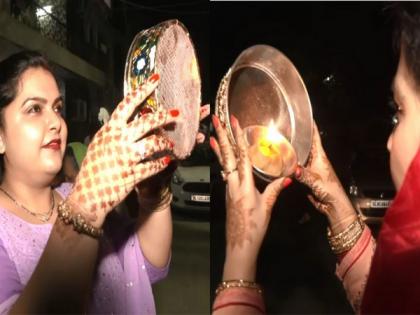Karwa Chauth 2024 Moon Rise Time Today: Check City Wise Timings Across India, Shubh Mahurat, Rituals and More
By Lokmat English Desk | Updated: October 20, 2024 20:38 IST2024-10-20T11:39:55+5:302024-10-20T20:38:54+5:30
According to the Purnimanta Hindu calendar, Karwa Chauth falls on Krishna Paksha Chaturthi in the Hindu month of Kartik. ...

Karwa Chauth 2024 Moon Rise Time Today: Check City Wise Timings Across India, Shubh Mahurat, Rituals and More
According to the Purnimanta Hindu calendar, Karwa Chauth falls on Krishna Paksha Chaturthi in the Hindu month of Kartik. This year, Karwa Chauth will be celebrated on October 20, Sunday, 2024, as per Drik Panchang. The Chaturthi Tithi commences at 6:46 am on October 20 and ends at 4:16 am on October 21 (Monday).
Karwa Chauth puja muhurat is from 5:46pm to 7:02pm for a duration of 1 hour and 16 minutes. The moonrise on Karwa Chauth is expected to be at 7:54 pm on Sunday, but will vary from city to city.
Moon Rise Timing
- Mumbai: 08:35 PM
- Delhi: 07:53 PM
- Lucknow: 07:42 PM
- Noida: 07:52 PM
- Gurugram: 07:55 PM
- Chennai: 08:18 PM
- Agra: 07:53 PM
- Kolkata: 07:22 PM
- Thane: 08:34 PM
- Pune: 08:32 PM
- Ratnagiri: 08:38 PM
- Kolhapur: 08:35 PM
- Satara: 08:33 PM
- Nashik: 08:28 PM
- Ahmednagar (Ahilyanagar): 08:27 PM
- Dhule: 08:22 PM
- Jalgaon: 08:19 PM
- Wardha: 08:07 PM
- Yavatmal: 08:09 PM - 09:00 PM
- Beed: 08:23 PM
- Sangli: 08:33 PM
- Sawantwadi: 08:38 PM
- Solapur: 08:25 PM
- Nagpur: 08:03 PM
- Amravati: 07:50 PM
- Akola: 08:13 PM
- Aurangabad (Chhatrapati Sambhajinagar): 08:22 PM
- Bhusawal: 08:18 PM
- Parbhani: 07:42 PM
- Nanded: 07:45 PM
- Dharashiv: 08:23 PM
- Bhandara: 08:01 PM
- Chandrapur: 08:06 PM
- Buldhana: 08:17 PM
- Malvan: 08:39 PM
- Goa: 08:39 PM
- Belgaum: 08:35 PM
- Indore: 08:13 PM
- Gwalior: 07:54 PM
Karva Chauth: A Tradition of Fasting for Husbands' Long Life
On Karva Chauth, wives observe a fast for the well-being and longevity of their husbands, breaking the fast in the evening after sighting the moon. The festival, celebrated a few days before Diwali, is part of the festive season and is often marked by husbands giving gifts to their wives. If you're considering expressing your appreciation for your wife, financial gifts are a thoughtful gesture during this time.
The Connection to Vat Purnima and the Legend of Karva
Similar to Vat Purnima, where women fast for their husbands, Karva Chauth is a Vrat (fast) that involves women fasting all day and drinking water at night after the moon rises. The practice of Karva Chauth is deeply rooted in tradition, and its significance is illustrated through stories from ancient texts, particularly the Mahabharata.
Also Read | Vakratunda Sankashti Chaturthi 2024: Date, Time, Rituals and Significance.
The Legend Behind Karva Chauth
The festival is linked to a legendary story about a devoted wife named Karva. One day, while she was washing herself in a river, a crocodile attacked her husband and dragged him under the water. Karva, deeply committed to her husband, abandoned her task and tried to save him. Despite her best efforts, the crocodile continued to pull him away.
At this point, the Yamadutas (messengers of Yama, the god of death) arrived to take her husband’s soul. However, witnessing her unwavering devotion, they informed Yamaraja (Yama, the god of death) about her actions. Impressed by her dedication, Yamaraja intervened and saved her husband from the crocodile. The incident occurred on the day of Chaturthi, and both of them performed a Chandra Darshan (moon sighting) to celebrate the occasion.
The Tradition of Moon Sighting and Fasting
In gratitude for her husband's life being spared, Karva chose to celebrate the event by observing a fast. This day came to be known as Karva Chauth, with women observing the fast every year as a way of expressing their devotion and gratitude to the moon.
Also Read | Karwa Chauth 2024: Throwback to Bollywood Couples Celebrating The Special Day.
The Sieve Tradition: A Symbol of Love
Karva, known for her devotion to her husband, regarded his face as more beautiful than the moon itself. To express this, she looked at her husband’s face through a sieve instead of directly at the moon. This practice, still observed today, symbolizes a wife’s deep love for her husband, where the moon is viewed indirectly through a sieve while praying for his long life and well-being.
Since then, the tradition of observing the moon through a sieve has become a key part of Karva Chauth celebrations. The sight of the moon through the sieve represents the woman’s devotion, while also symbolizing the importance of her husband in her life, even more than the moon itself.
Open in app